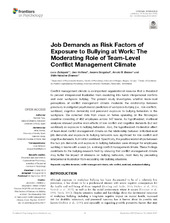| dc.contributor.author | Zahlquist, Lena | |
| dc.contributor.author | Hetland, Jørn | |
| dc.contributor.author | Skogstad, Anders | |
| dc.contributor.author | Bakker, Arnold B. | |
| dc.contributor.author | Einarsen, Ståle | |
| dc.date.accessioned | 2020-08-13T08:33:46Z | |
| dc.date.available | 2020-08-13T08:33:46Z | |
| dc.date.issued | 2019 | |
| dc.identifier.issn | 1664-1078 | |
| dc.identifier.uri | https://hdl.handle.net/1956/23720 | |
| dc.description.abstract | Conflict management climate is an important organizational resource that is theorized to prevent interpersonal frustration from escalating into harsh interpersonal conflicts and even workplace bullying. The present study investigates whether team-level perceptions of conflict management climate moderate the relationship between previously investigated psychosocial predictors of workplace bullying (i.e., role conflicts, workload, cognitive demands) and perceived exposure to bullying behaviors in the workplace. We collected data from crews on ferries operating on the Norwegian coastline consisting of 462 employees across 147 teams. As hypothesized, multilevel analyses showed positive main effects of role conflict and cognitive demands (but not workload) on exposure to bullying behaviors. Also, the hypothesized moderation effect of team-level conflict management climate on the relationship between individual-level job demands and exposure to bullying behaviors was significant for role conflict and cognitive demands, but not for workload. Specifically, the positive relationships between the two job demands and exposure to bullying behaviors were stronger for employees working in teams with a weak (vs. a strong) conflict management climate. These findings contribute to the bullying research field by showing that conflict management climate may buffer the impact of stressors on bullying behaviors, most likely by preventing interpersonal frustration from escalating into bullying situations. | en_US |
| dc.language.iso | eng | eng |
| dc.publisher | Frontiers | eng |
| dc.rights | Attribution CC BY | eng |
| dc.rights.uri | http://creativecommons.org/licenses/by/4.0 | eng |
| dc.title | Job Demands as Risk Factors of Exposure to Bullying at Work: The Moderating Role of Team-Level Conflict Management Climate | eng |
| dc.type | Peer reviewed | |
| dc.type | Journal article | |
| dc.date.updated | 2019-11-21T13:52:38Z | |
| dc.description.version | publishedVersion | |
| dc.rights.holder | Copyright 2019 The Author(s) | eng |
| dc.source.articlenumber | 2017 | |
| dc.identifier.doi | https://doi.org/10.3389/fpsyg.2019.02017 | |
| dc.identifier.cristin | 1725672 | |
| dc.source.journal | Frontiers in Psychology | |
| dc.identifier.citation | Frontiers in Psychology. 2019, 10, 2017. | |
| dc.source.volume | 10 | |

